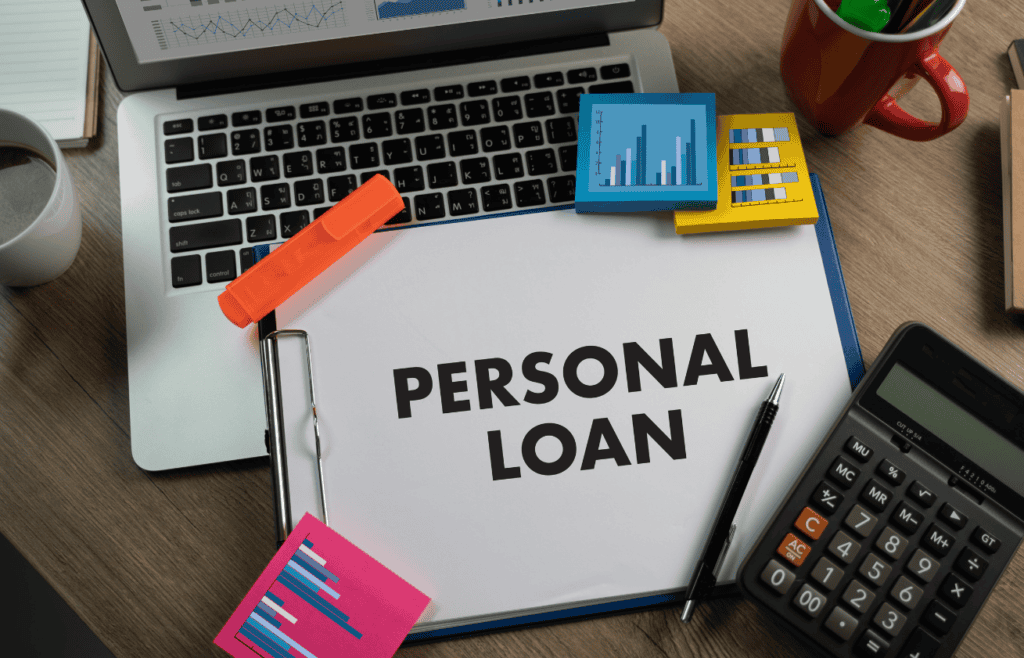In today’s financial landscape, taking personal loans has become a common strategy for managing various expenses, from unexpected emergencies to consolidating debt or funding major purchases.
Table of Contents
However, the ease of access to personal loans can also lead to irresponsible borrowing and financial stress if not approached with caution and foresight.
In this guide, we'll delve into the art of borrowing smarter, not harder, to help you make informed decisions on taking personal loans wisely.

Understanding Personal Loans
First and foremost, let's establish what a personal loan is. When looking to get started with a personal loan, you should know that a personal loan is a type of unsecured loan that individuals can borrow from banks, credit unions, or online lenders.
Unlike secured loans that are backed by collateral (like a home or car), personal loans are based primarily on your creditworthiness and income.
The lack of collateral makes personal loans riskier for lenders, which is why they typically have higher interest rates compared to secured loans. However, this also makes personal loans more accessible to borrowers who may not have valuable assets to pledge as security.

Personal loans can be used for various purposes, including:
Debt Consolidation: Combining multiple debts into a single personal loan can simplify payments and potentially lower interest costs.
Emergency Expenses: Personal loans can help cover unexpected medical bills, car repairs, or other urgent financial needs.
Home Improvements: Funding home renovations or repairs through a personal loan is a common use case.
Education Expenses: Some borrowers use personal loans to finance education or training programs.
Major Purchases: Whether it's buying furniture, appliances, or electronics, personal loans can provide funds for significant purchases.
When considering a personal loan, it's essential to understand the terms and conditions, including the interest rate, repayment schedule, fees, and penalties for late payments. Compare offers from different lenders to find the most favorable terms based on your financial situation.
Additionally, be mindful of the impact that taking on a personal loan can have on your credit score. Timely repayments can positively contribute to your credit history, while missed payments or defaulting on the loan can damage your creditworthiness.
Overall, personal loans can be valuable financial tools when used responsibly and for the right purposes. However, it's crucial to borrow only what you need, ensure you can afford the repayments, and have a clear plan for repayment to avoid falling into unnecessary debt.
Assessing Your Financial Situation
Before even considering a personal loan, take a step back to evaluate your financial situation. Ask yourself:
Do I Need This Loan?
Consider if the expense you're planning to cover with a loan is essential or discretionary. Essential expenses might include medical bills, urgent home repairs, or unexpected car repairs. Discretionary expenses could be a vacation or a luxury purchase. Prioritize essential expenses over discretionary ones.
Can I Afford the Payments?
Calculate the monthly payments you'll need to make if you take out a loan. Factor in your current income, existing expenses, and potential changes in your financial situation. Ensure that the loan payments won't strain your budget or jeopardize your ability to meet other financial obligations.
What Are My Alternatives?
Explore other options before settling on a personal loan. For example, could you tap into savings, negotiate payment plans with creditors, or consider a low-interest credit card? Exhausting these alternatives can help you minimize borrowing and save on interest costs.
Assessing your financial situation thoroughly before borrowing is crucial to avoid unnecessary debt and financial strain. By evaluating the necessity of the expense, considering your ability to afford loan payments comfortably, and exploring alternative solutions, you can make a more informed decision regarding personal loans.
Essential expenses like medical emergencies or urgent home repairs often warrant immediate financial attention, making a personal loan a viable option.
However, discretionary expenses such as vacations or luxury purchases may be better financed through savings or alternative payment methods to avoid unnecessary interest payments.
Calculating the affordability of loan payments involves analyzing your monthly income, existing expenses, and potential fluctuations in your financial situation. Ensure that taking on a loan won't compromise your ability to meet essential living costs or save for future needs.
Exploring alternative options can also lead to cost savings and reduced borrowing. Negotiating payment plans with existing creditors, utilizing savings, or leveraging low-interest credit cards can be more financially advantageous than taking on a personal loan, especially for non-urgent expenses.
Assessing your financial situation comprehensively and considering the necessity, affordability, and alternatives to personal loans are fundamental steps in making responsible borrowing decisions.
By prioritizing essential expenses, ensuring affordability, and exploring cost-effective alternatives, you can borrow smarter and avoid unnecessary financial burdens.

Choosing the Right Loan Terms
Once you've determined that a personal loan is the best option for your needs, focus on choosing the right loan terms:
Interest Rate:
The interest rate significantly impacts the overall cost of your loan. Compare rates from multiple lenders and opt for the lowest rate possible. A lower rate can save you hundreds or even thousands of dollars over the loan term.
When comparing interest rates, consider both fixed and variable rates. Fixed rates offer stability as your payments remain constant throughout the loan term, while variable rates can fluctuate based on market conditions. Assess your risk tolerance and financial goals to choose the most suitable rate type.
Loan Amount and Term:
Borrow only what you need and can comfortably repay. Avoid the temptation to borrow more just because you qualify for a higher amount. Additionally, choose a loan term that aligns with your financial goals.
Shorter terms usually have higher monthly payments but lower overall interest costs. Use loan calculators to estimate monthly payments and total interest costs based on different loan amounts and terms.
Aim for a balance between manageable monthly payments and minimizing interest expenses by opting for the shortest term you can afford.
Fees and Penalties:
Pay attention to any origination fees, prepayment penalties, or other charges associated with the loan. Factor these costs into your decision-making process and opt for loans with transparent fee structures.
Some lenders may offer no-fee loans or waive certain fees under specific conditions. Take advantage of such offers if they align with your borrowing needs and help reduce overall loan costs.
By focusing on these key loan terms, you can optimize the borrowing experience and save money over the loan's duration. Prioritize finding a competitive interest rate, borrowing responsibly based on your needs and repayment capacity, and minimizing fees and penalties to make the most of your loan.
Improving Your Creditworthiness
Your credit score plays a crucial role in determining the interest rate and terms you'll qualify for when applying for a personal loan. To enhance your creditworthiness and secure favorable loan terms, consider the following steps:
Check Your Credit Report:
Begin by obtaining a copy of your credit report from major credit bureaus such as Equifax, Experian, and TransUnion. Review the report carefully for any errors, inaccuracies, or outdated information that could be negatively impacting your credit score.
Common errors include incorrect account balances, duplicate accounts, or fraudulent activity. Dispute any discrepancies you find and work with the credit bureaus to rectify the issues promptly. A clean and accurate credit report is essential for showcasing your creditworthiness to lenders.
Reduce Debt-to-Income Ratio (DTI):
Lenders assess your debt-to-income ratio (DTI) to evaluate your ability to manage additional debt responsibly. Aim to lower your DTI by paying down existing debts, such as credit card balances or installment loans.
Increasing your income or finding ways to reduce monthly expenses can also contribute to lowering your DTI. A lower DTI signals to lenders that you have sufficient income to cover loan payments without being overly burdened by debt.
Make Timely Payments:
Consistently making on-time payments on credit accounts is one of the most effective ways to improve your credit score over time. Late payments, defaults, or collections can significantly damage your creditworthiness and make it harder to qualify for favorable loan terms.
Set up automatic payments or reminders to ensure you never miss a payment deadline. Timely payments demonstrate financial responsibility and reliability to potential lenders.
By proactively addressing these areas and improving your creditworthiness, you can enhance your chances of qualifying for lower interest rates, higher loan amounts, and more favorable terms when applying for a personal loan.
Building a strong credit profile not only benefits you in securing loans but also opens doors to better financial opportunities in the future.
Applying for the Loan
When applying for a personal loan, follow these steps to ensure a smooth and successful process:
Gather Necessary Documents: Prepare documents such as proof of income, identification, bank statements, and employment information. Having these documents ready can expedite the loan application.
Compare Multiple Offers: Obtain quotes from different lenders and compare the offers in terms of interest rates, fees, and loan terms. Don't settle for the first offer you receive; shop around for the best deal.
Read the Fine Print: Carefully review the loan agreement, including all terms and conditions, before signing. Pay attention to interest rates, repayment schedules, fees, and any penalties.
Managing Your Loan Responsibly
Once you've secured a personal loan, manage it responsibly to avoid financial pitfalls:
Stick to Your Budget: Incorporate loan payments into your budget and ensure that you can afford them without compromising other financial obligations.
Avoid Taking on Additional Debt: Resist the urge to take on more debt while repaying your loan. Focus on reducing existing debt and improving your financial stability.
Communicate with Your Lender: If you encounter financial difficulties or anticipate missing a payment, communicate with your lender promptly. They may offer assistance or alternative repayment options.

Borrowing smarter, not harder, is about making informed decisions, assessing your needs realistically, and managing your finances responsibly. Personal loans can be valuable tools when used wisely, helping you navigate unexpected expenses or achieve financial goals.
By understanding the loan process, choosing favorable terms, improving your creditworthiness, and managing your loan responsibly, you can leverage personal loans effectively without falling into debt traps.
Remember, the key is to borrow what you need, within your means, and with a clear repayment strategy in place.
Taking Personal Loans FAQs
- Why should I consider a personal loan instead of other forms of borrowing?
Personal loans offer several advantages, including fixed interest rates, predictable monthly payments, and flexibility in usage.
Unlike credit cards, personal loans often have lower interest rates, making them a cost-effective option for larger expenses or debt consolidation. Additionally, personal loans don't require collateral, making them accessible to a wider range of borrowers.
- How can I ensure that I'm borrowing responsibly and within my means?
To borrow responsibly, assess your financial situation carefully. Determine if the expense is essential, calculate affordable monthly payments, and explore alternative options before committing to a personal loan.
Choose loan terms that align with your budget and financial goals, and avoid borrowing more than you need or can comfortably repay.
- What role does my credit score play in obtaining a personal loan?
Your credit score plays a significant role in determining the interest rate and terms you'll qualify for. A higher credit score typically results in lower interest rates and better loan terms.
Before applying for a personal loan, review your credit report, address any errors or discrepancies, and work on improving your creditworthiness by making timely payments and reducing debt.
- What are some red flags or warning signs to watch out for when considering a personal loan?
Be cautious of lenders offering excessively high interest rates, hidden fees, or unrealistic loan terms. Avoid lenders who pressure you into borrowing more than you need or who have a history of predatory practices.
Additionally, steer clear of payday loans or high-cost loans that can trap you in a cycle of debt. Always read the loan agreement thoroughly and ask questions about any terms or conditions you don't understand.



